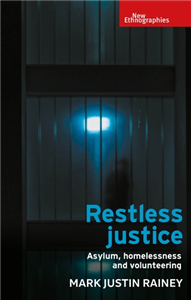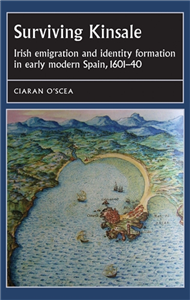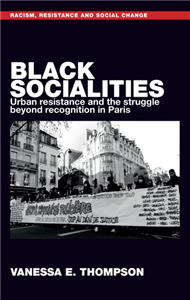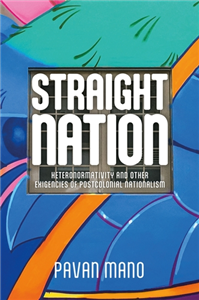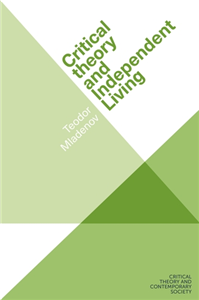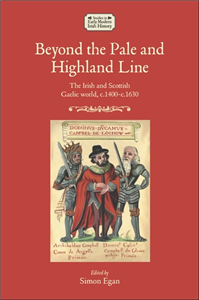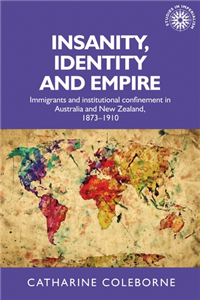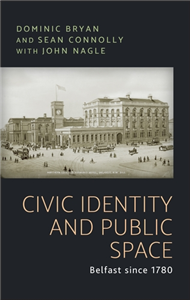Your Search Results
-
Promoted ContentHumanities & Social SciencesMay 2025
Statelessness after Arendt
European refugees in China and the Pacific during the Second World War
by Kolleen Guy, Jay Winter
This book is a study of statelessness in the period of the Second World War. It breaks new ground by focusing not on Europe, but on the Asian and Pacific theatres of the conflict. This perspective enables us to go beyond Hannah Arendt's classic account of statelessness in her Origins of Totalitarianism. To her, statelessness was the product of a failed European nation-state system. We find a very different story when we examine the history of stateless people, many of them Jews, fleeing to Asia from Europe. In Asia, we see that being stateless was not a uniform experience, but a variety of possibilities reflecting the political structure of the states and cities in which refugees found shelter. We find too that stateless people managed to enter the political realm long before they reached the threshold of citizenship.
-
Promoted ContentFebruary 2021
Layers
by Poznanski, U.
Can You Believe Your Eyes? Dorian has been living on the streets since running away from home, and has always managed to fend for himself pretty well. But when he wakes up one morning beside a dead homeless man who has evidently been murdered, Dorian panics – he can’t remember anything of what happened the previous night. Is he responsible for the man’s murder? Then a stranger appears with an unexpected offer of help, and Dorian seizes the opportunity with both hands – this is his chance to hide from the police. The stranger works with young people in need, and he takes Dorian to a villa where he is given food, new clothes and even schooling.But Dorian soon learns that you get nothing for free in this life. In return for being looked after at the villa, Dorian is expected to distribute mysterious free gifts – gifts which are very carefully sealed. And when an unexpected turn of events results in him keeping one of the gifts, he finds himself being hunted by merciless pursuers. After the international YA-bestseller Erebos, Saeculum and The Eleria-Trilogy Ursula Poznanski now presents her new thriller: Layers Awarded with the Hans-Jörg-Martin Prize 2016 for the best YA-Thriller! More information also available under: www.layers-buch.de
-
 Trusted Partner
Humanities & Social SciencesJanuary 2026
Trusted Partner
Humanities & Social SciencesJanuary 2026The tragedy of the border
Asylum, destitution and homelessness
by Mark Rainey
Amid the global migration crisis, the UK has created and increasingly hostile policy environment for asylum seekers that has pushed many into unnecessary hardship and homelessness. This volume is an ethnographic study alongside refused asylum seekers and refugees living destitute in Manchester, UK. Based on over three years of research in emergency night shelters and on the streets of the city, it draws on the stories and experiences of those who have been driven into destitution by an antagonistic immigration system. The book not only explores how legal and temporal uncertainty shapes the daily lives of those who have had their asylum claims refused, but also attends to the experiences of volunteers and activists working on the frontline of the crisis. While the work is rich in detail, it also extends outwards and offers new insights into our understanding of borders and the need to rethink the grand notions of justice and hospitality.
-
 Trusted Partner
Humanities & Social SciencesApril 2023
Trusted Partner
Humanities & Social SciencesApril 2023Statelessness, governance, and the problem of citizenship
by Tendayi Bloom, Lindsey N. Kingston
-
 Trusted Partner
June 2024
Trusted Partner
June 2024Dark Scar
A psychological Thriller. Dr. Evelin Wolf and Alex Gutenberg 2
by Roxann Hill, Paul Wagle, Rebecca Steinberg, John Julian, Nicholas Mockridge, Alexios Saskalidis
Death lurks in the shadows Who are you? Hamburg Criminal Psychologist Dr. Evelin Wolf wonders as she examines the severely disturbed homeless man with the conspicuous scar across his face. The extremely aggressive man with no memory or identity is alleged to have committed a brutal murder. But Evelin and Assistant District Attorney Alex Gutenberg doubt his guilt and suspect there is something more behind the supposedly crystal-clear case. Shortly thereafter, Hamburg is shaken by a series of murders unparalleled in cruelty and sadism. The perverted killer draws a bloody trail across the Hanseatic city and links it with a clear message to Alex and Evelin: Revenge. Alex and Evelin work feverishly to solve both cases. In the process, they make a fatal mistake. And the killer exploits it mercilessly…
-
 Trusted Partner
Humanities & Social SciencesJuly 2015
Trusted Partner
Humanities & Social SciencesJuly 2015Surviving Kinsale
Irish emigration and identity formation in early modern Spain, 1601–40
by Ciaran O'Scea, Joseph Bergin, Penny Roberts, Bill Naphy
In the aftermath of the Battle of Kinsale in 1601 as many as 10,000 Irish emigrated from Ireland to Galicia in the north-west of Spain. Between 1601 and 1608 the brunt of this immigration fell on the city of La Coruña, which became a virtual encampment of starving homeless Irish nobles, soldiers, women, children, elderly and poor. This is the story of that community and how its members adapted to their new circumstances, and how they themselves, their social structures and beliefs were transformed by their immigrant experience. Through an examination of the community across a broad range of social cultural aspects such as family, literacy, material culture, the acquisition of honours, religious sentiment, and social ascent, important new insights into Irish socio-cultural history have been uncovered. ;
-
 Trusted Partner
Humanities & Social SciencesJanuary 2025
Trusted Partner
Humanities & Social SciencesJanuary 2025Europeanisation as violence
Souths and Easts as method
by Kolar Aparna, Daria Krivonos, Elisa Pascucci
The book offers a novel lens to situate Europeanisation as violence - through institutions and technologies of development, cultural heritage, and borders, among others - by bringing South and East within a relational frame. Through four inter-related sections, it foregrounds Europeanisation as infrastructural violence and colonial asymmetries, slow violence and the construction of stratified subalternities, epistemic dispossession, and border epistemologies.
-
 Trusted Partner
Humanities & Social SciencesJuly 2021
Trusted Partner
Humanities & Social SciencesJuly 2021The fringes of citizenship
Romani minorities in Europe and civic marginalisation
by Julija Sardelic, Gurminder Bhambra
This book presents a socio-legal enquiry into the civic marginalisation of Roma in Europe. Instead of looking only at Roma's position as migrants, an ethnic minority or a socio-economically disadvantage group, it considers them as European citizens, questioning why they are typically used to describe exceptionalities of citizenship in developed liberal democracies rather than as evidence for how problematic the conceptualisation of citizenship is at its core. Developing novel theoretical concepts, such as the fringes of citizenship and the invisible edges of citizenship, the book investigates a variety of topics around citizenship, including migration and free movement, statelessness and school segregation, as well as how marginalised minorities respond to such predicaments. It argues that while Roma are unique as a minority, the treatment that marginalises them is not. This is demonstrated by comparing their position to that of other marginalised minorities around the globe.
-
 Trusted Partner
Humanities & Social SciencesMarch 2026
Trusted Partner
Humanities & Social SciencesMarch 2026Black socialities
Urban resistance and the struggle beyond recognition in Paris
by Vanessa Eileen Thompson
From author: This is a cutting-edge exploration of black urban politics in Parisian racialized working class and working poor districts, the formation of abolition geography, and the possibilities of new forms of political blackness. In Black Socialities. Urban resistance and the struggle beyond recognition in Paris, Vanessa E. Thompson argues that black urban politics in the French banlieues are multi-racial and spatially grounded towards abolition. Based on a close engagement with urban black activist practices against racial imagery in the city, policing and state racism, and housing insecurity, she shows how radical anti-racism goes beyond struggles for recognition and unfolds alongside new formations of political blackness that is based on urban conviviality. This form of black politics has much to teach us in this current conjuncture of liberal anti-racism and state recognition politics.
-
 Trusted Partner
Humanities & Social SciencesMarch 2025
Trusted Partner
Humanities & Social SciencesMarch 2025Straight nation
Heteronormativity and other exigencies of postcolonial nationalism
by Pavan Mano
In Straight Nation, Pavan Mano reveals the logic of straightness that sits at the heart of postcolonial nationalism in Singapore. Mano rejects the romantic notion of the nation as a haven of belonging, showing it to be a relentless force that is allied with heteronormativity to create a host of minoritized and xenologized figures. Through meticulous exploration and close reading of a swathe of texts, Mano unveils the instrumental role of sexuality in structuring the national imaginary. The book adroitly demonstrates how queerness is rendered foreign in postcolonial Singapore and functions alongside technologies of "race", gender, and class. A provocative critique of narrow contemporary identity politics and its concomitant stymying of a more ambitious political critique, Straight Nation sets out an argument that moves beyond the negativity of traditional critique into a space of (re)thinking, (re)building and (re)imagining.
-
 Trusted Partner
Humanities & Social SciencesDecember 2024
Trusted Partner
Humanities & Social SciencesDecember 2024Critical theory and Independent Living
by Teodor Mladenov
Critical theory and Independent Living explores intersections between contemporary critical theory and disabled people's struggle for self-determination. The book highlights the affinities between the Independent Living movement and studies of epistemic injustice, biopower, and psychopower. It discusses in depth the activists' critical engagement with welfare-state paternalism, neoliberal marketisation, and familialism. This helps develop a pioneering comparison between various welfare regimes grounded in Independent Living advocacy. The book draws on the activism of disabled people from the European Network on Independent Living (ENIL) by developing case studies of the ENIL's campaigning for deinstitutionalisation and personal assistance. It is argued that this work helps rethink independence as a form of interdependence, and that this reframing is pivotal for critical theorising in the twenty-first century.
-
 Trusted Partner
September 2022
Trusted Partner
September 2022Identity or Not?
by Jean-Pierre Wils (ed.)
Questions of identity trigger controversial and highly emotional discussions in the political and social debate. The positions range from radically emancipatory perspectives to authoritarian and restorative efforts on the far right wing of politics. Liberal democracies are now opening up – slowly – as identity- and gender-sensitive forums. Opposite them are the 'new ethics' of illiberal democracies and totalitarian states that are aimed at ethnic homogeneity and gender uniformity. But that's not to say that there is unity in the liberal settings on the necessary degree of identity politics. Both language and gender politics are deeply controversial. Do we need an 'identity' and, if so, which one or how many? Can the identity debate be extended by means of other concepts?
-
 Trusted Partner
Humanities & Social SciencesSeptember 2020
Trusted Partner
Humanities & Social SciencesSeptember 2020Cooking up a revolution
by Sean Parson, Uri Gordon, Laurence Davis, Nathan Jun, Alex Prichard
-
 Trusted Partner
Humanities & Social SciencesApril 2025
Trusted Partner
Humanities & Social SciencesApril 2025Beyond the Pale and Highland Line
The Irish and Scottish Gaelic world
by Simon Egan
This book offers important new insights into the history and culture of the Gaelic-speaking world from the mid-fifteenth century through to the reign of James VI and I. Throughout this period, the reach of the English and Scottish crowns within these western regions was limited. The initiative lay with local communities and royal power was contingent upon negotiating with well-established and largely autonomous aristocratic lineages. Moreover, events within this western world could exert a powerful, often unpredictable, influence upon the affairs of the wider archipelago. Using a series of case studies, this collection examines the evolving relationship between Ireland and Scotland in rich detail. It demonstrates how this world interacted with the encroaching English and Scottish states and underlines the importance of paying closer attention to this neglected area of Irish and British history.
-
 Trusted Partner
Biography & True StoriesFebruary 2024
Trusted Partner
Biography & True StoriesFebruary 2024Revolutionary lives of the Red and Black Atlantic since 1917
by David Featherstone, Christian Høgsbjerg, Alan Rice
Revolutionary lives of the Red and Black Atlantic brings to light the life histories of a wide range of radical figures whose political activity in relation to the black liberation struggle was profoundly shaped by the global impact and legacy of the Russian Revolution of October 1917. The volume introduces new perspectives on the intellectual trajectories of well-known figures and critical activists including C. L. R. James, Paul Robeson, Walter Rodney and Grace P. Campbell. This biographical approach brings a vivid and distinctive lens to bear on how racialised social and political worlds were negotiated and experienced by these revolutionary figures, and on historic black radical engagements with left political movements, in the wake of the Russian Revolution.
-
 Trusted Partner
Humanities & Social SciencesJune 2021
Trusted Partner
Humanities & Social SciencesJune 2021Insanity, identity and empire
Immigrants and institutional confinement in Australia and New Zealand, 1873–1910
by Catharine Coleborne
Insanity, identity and empire examines the formation of colonial social identities inside the institutions for the insane in Australia and New Zealand. Taking a large sample of patient records, it pays particular attention to gender, ethnicity and class as categories of analysis, reminding us of the varied journeys of immigrants to the colonies and of how and where they stopped, for different reasons, inside the social institutions of the period. It is about their stories of mobility, how these were told and produced inside institutions for the insane, and how, in the telling, colonial identities were asserted and formed. Having engaged with the structural imperatives of empire and with the varied imperial meanings of gender, sexuality and medicine, historians have considered the movements of travellers, migrants, military bodies and medical personnel, and 'transnational lives'. This book examines an empire-wide discourse of 'madness' as part of this inquiry.
-
 Trusted Partner
Humanities & Social SciencesJune 2025
Trusted Partner
Humanities & Social SciencesJune 2025Private property and the fear of social chaos
by Aidan Beatty
-
 Trusted Partner
Humanities & Social SciencesMarch 2022
Trusted Partner
Humanities & Social SciencesMarch 2022Civic identity and public space
Belfast since 1780
by Dominic Bryan, Sean J. Connolly, John Nagle
Civic identity and public space, focussing on Belfast, and bringing together the work of a historian and two social scientists, offers a new perspective on the sometimes lethal conflicts over parades, flags and other issues that continue to disrupt political life in Northern Ireland. It examines the emergence during the nineteenth century of the concept of public space and the development of new strategies for its regulation, the establishment, the new conditions created by the emergence in 1920 of a Northern Ireland state, of a near monopoly of public space enjoyed by Protestants and unionists, and the break down of that monopoly in more recent decades. Today policy makers and politicians struggle to devise a strategy for the management of public space in a divided city, while endeavouring to promote a new sense of civic identity that will transcend long-standing sectarian and political divisions.
-
 Trusted Partner
Humanities & Social SciencesAugust 2021
Trusted Partner
Humanities & Social SciencesAugust 2021The Red and the Black
The Russian Revolution and the Black Atlantic
by David Featherstone, Christian Høgsbjerg
The Russian Revolution of 1917 was not just a world-historical event in its own right, but also struck powerful blows against racism and imperialism, and so inspired many black radicals internationally. This edited collection explores the implications of the creation of the Soviet Union and the Communist International for black and colonial liberation struggles across the African diaspora. It examines the critical intellectual influence of Marxism and Bolshevism on the current of revolutionary 'black internationalism' and analyses how 'Red October' was viewed within the contested articulations of different struggles against racism and colonialism. Challenging European-centred understandings of the Russian Revolution and the global left, The Red and the Black offers new insights on the relations between Communism, various lefts and anti-colonialisms across the Black Atlantic - including Garveyism and various other strands of Pan-Africanism. The volume makes a major and original intellectual contribution by making the relations between the Russian Revolution and the Black Atlantic central to debates on questions relating to racism, resistance and social change.
-
 Trusted Partner
Political oppression & persecutionJuly 2014
Trusted Partner
Political oppression & persecutionJuly 2014Co-memory and melancholia
Israelis memorialising the Palestinian Nakba
by Ronit Lentin
The 1948 war that led to the creation of the State of Israel also resulted in the destruction of Palestinian society when some 80 per cent of the Palestinians who lived in the major part of Palestine upon which Israel was established became refugees. Israelis call the 1948 war their 'War of Independence' and the Palestinians their 'Nakba', or catastrophe. After many years of Nakba denial, land appropriation, political discrimination against the Palestinians within Israel and the denial of rights to Palestinian refugees, in recent years the Nakba is beginning to penetrate Israeli public discourse. This book, available at last in paperback, explores the construction of collective memory in Israeli society, where the memory of the trauma of the Holocaust and of Israel's war dead competes with the memory claims of the dispossessed Palestinians. Against a background of the Israeli resistance movement, Lentin's central argument is that co-memorating the Nakba by Israeli Jews is motivated by an unresolved melancholia about the disappearance of Palestine and the dispossession of the Palestinians, a melancholia that shifts mourning from the lost object to the grieving subject. Lentin theorises Nakba co-memory as a politics of resistance, counterpoising co-memorative practices by internally displaced Israeli Palestinians with Israeli Jewish discourses of the Palestinian right of return, and questions whether return narratives by Israeli Jews, courageous as they may seem, are ultimately about Israeli Jewish self-healing rather than justice for Palestine.






